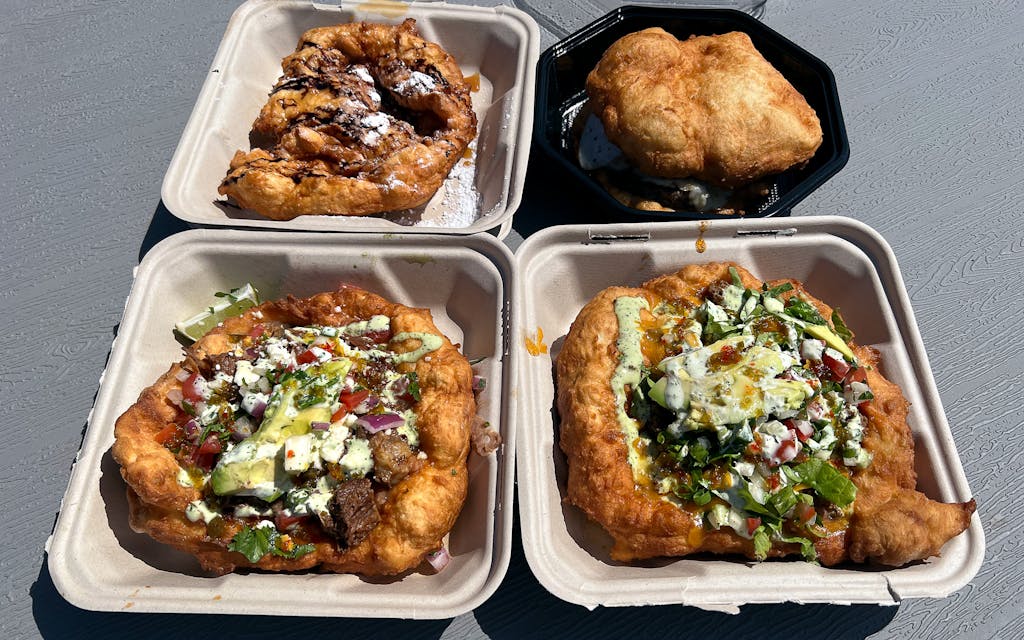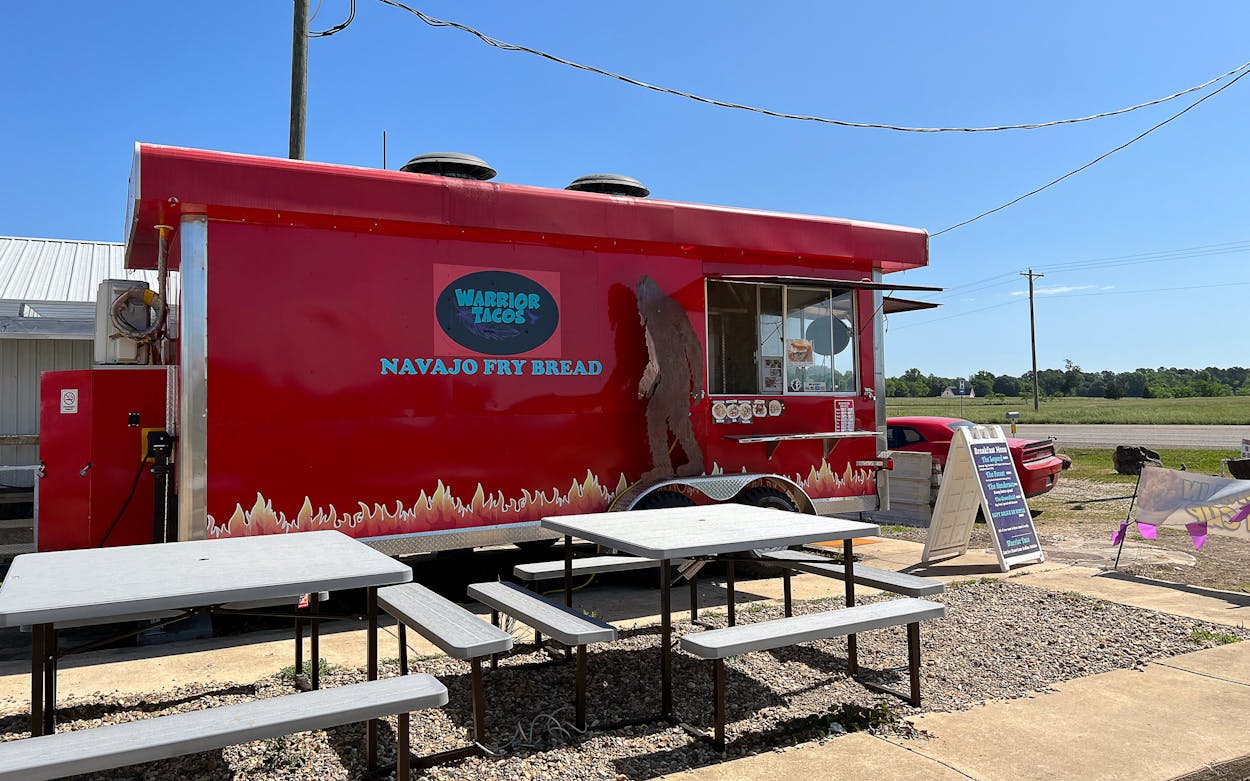The interior of the small, deep-fried disc of dough is cavernous with air pockets. The exterior is tawny brown, even though there isn’t even a whiff of frying oil. It’s got a sweet flavor, which pairs as well with savory options as it does indulgent desserts. This is fry bread—specifically the fry bread at Warrior Taco in Pittsburg. The story of the East Texas trailer is as complex as that of the Native American dish.
Warrior Taco cofounder and co-owner Jennifer Scharen was born in the Dallas–Fort Worth suburb of Bedford. When she was nine, her family moved to the rural butte-top town of Culver, Oregon. Scharen expressed love through food from a young age, says her mother, Paula Myers. “There was a big ministry [in Fort Worth] and she would be in there cooking eggs, stirring the eggs, and putting them in the bins to take to the serving area,” Myers recalls.
Scharen’s passion for cooking continued throughout her youth. As a teenager, she worked in the kitchen of the casino at Warm Springs Indian Reservation, home to the Confederated Tribes of the Wasco, Tenino, and Paiute, near Culver. It’s there she met her late husband, Heath Scharen, who was of Cherokee descent. It’s also where she learned about fry bread—often called Navajo fry bread, Indian fry bread, or Indian tacos—which is now the speciality at Warrior Taco.
Whatever the name, fry bread is a ubiquitous dish in Native American homes, powwows, and rodeos. It’s as emblematic of triumph as it is tragedy. As I note in my 2020 book, American Tacos: A History and Guide, fry bread has origins, in part, in the forced relocations of Navajos and other Indigenous peoples by U.S. armed forces in what is now the American Southwest. The displacement events are grouped under the name the Long Walk. As multiple histories note, fry bread is a culinary innovation by the victims. They took commodities they were given, such as rancid flour and sugar, and deep-fried the foul ingredients into something that would provide some level of sustenance.
Now, fry bread is often championed as a symbol of Indigenous ingenuity and cultural perseverance. Thomas Builds-the-Fire wore a “Frybread Power” T-shirt in Sherman Alexie’s 1998 film Smoke Signals. But it’s also reviled as a reminder of the legacy of colonization, attempted genocide, and food dependence. Creek/Euchee artist Steven Deo created a 2004 PSA-inspired poster with the phrase “Frybread Kills.” For Scharen, Warrior Taco’s fry bread is about keeping the legacy of her late husband alive and sharing his struggles with others.
In 2019, the Scharens and Jennifer’s parents purchased a food trailer to prepare and sell fry bread tacos in Saginaw, a suburb of Fort Worth. With the concept set, the Scharens decided to use the fry bread recipe passed down by Heath’s grandmother. The theme—Bigfoot and similar mythical wilderness simians—came from Jennifer’s dad, Ronald James Myers. “My father is obsessed,” Scharen told me during a phone interview. Everything was going as planned.
Then, Heath died by suicide. Two of their sons found him in the family’s home. “To this day, I don’t know why he did that,” Scharen says. “He just had a lot of hurt from his past and he couldn’t get over stuff.” Demons haunted Heath, and the devastation of losing him haunts the rest of the family.
Despite their loss, Scharen and her family opened Warrior Taco in 2020 at the Saginaw Switchyard. They were open only on weekends, as Scharen kept her day job as a cook. “I took all of that hurt from him doing that and just put it into the food truck,” she says. “I really wanted to show people love with good food and that there’s so much hurt in this world but there is hope. Suicide is not the answer.”
Scharen spends a lot of time listening to customers drawn by the purple and teal flag of suicide awareness and prevention that hangs on the truck. One customer told Scharen that her own husband had died by suicide, too. “Let me show you love by making you some good food and listening to you,” Scharen responded. What wasn’t sold at the end of the day, Scharen donated to homeless people in the Fort Worth area.

About two years later, Scharen announced on Warrior Taco’s Facebook page that the trailer had closed and would be relocating to East Texas. The family reopened Warrior Taco on February 1, 2023, in Pittsburg, approximately two hours east of Dallas. That’s where I enjoyed perhaps a little too much fry bread—but I don’t regret one bite.
The signature dish, the Bigfoot, is the most traditional fry bread. It’s topped with saucy ground beef, mild but colorful pico de gallo, a sprinkle of shredded lettuce, a flurry of queso fresco, crema, little plops of guacamole, and, to finish, a lattice of sweet jalapeño jelly. The jelly is applied to almost every menu item. “It’s my thing,” Scharen says. The guacamole was a surprise, too. “You can’t have a taco without guacamole,” Paula Myers chimes in.
Indeed, avocado, usually in the form of a small fan of slices, caps most of the tacos. The Yeti subs ground beef for a juicy mixture of chicken and beans, while the Apeman is served with threads of beef barbacoa punctuated with beans. Each bite of the tacos, which are so hefty they must be consumed with utensils, is a marvel. Warrior Taco is serving the best savory fry bread tacos I’ve had in years.
Warrior Taco also serves breakfast sandwiches like the Legend breakfast sandwich, Scharen’s favorite. I relished the egg, pepper jack cheese, and sausage patty in fry bread with a fork.
Of course, I couldn’t leave without trying the dessert fry bread. Dubbed the Fried Feathers, the flat disc of dough is splashed with chocolate syrup, powdered sugar, and caramel sauce. Even though I ended up with sugar all over my shirt, I experienced a wild joy. It’s the kind of joy that can only be shared with someone by another who has experienced great tragedy.
If you or someone you know is considering suicide or having mental health challenges, talk to someone you trust or dial 988 to reach the national Suicide and Crisis Lifeline.
Warrior Taco
2516 U.S. Highway 271 N., Pittsburg
Phone: 817-412-3395
Hours: Tuesday–Friday 11 a.m.–6 p.m., Saturday 9 a.m.–7 p.m.
- More About:
- Tacos








